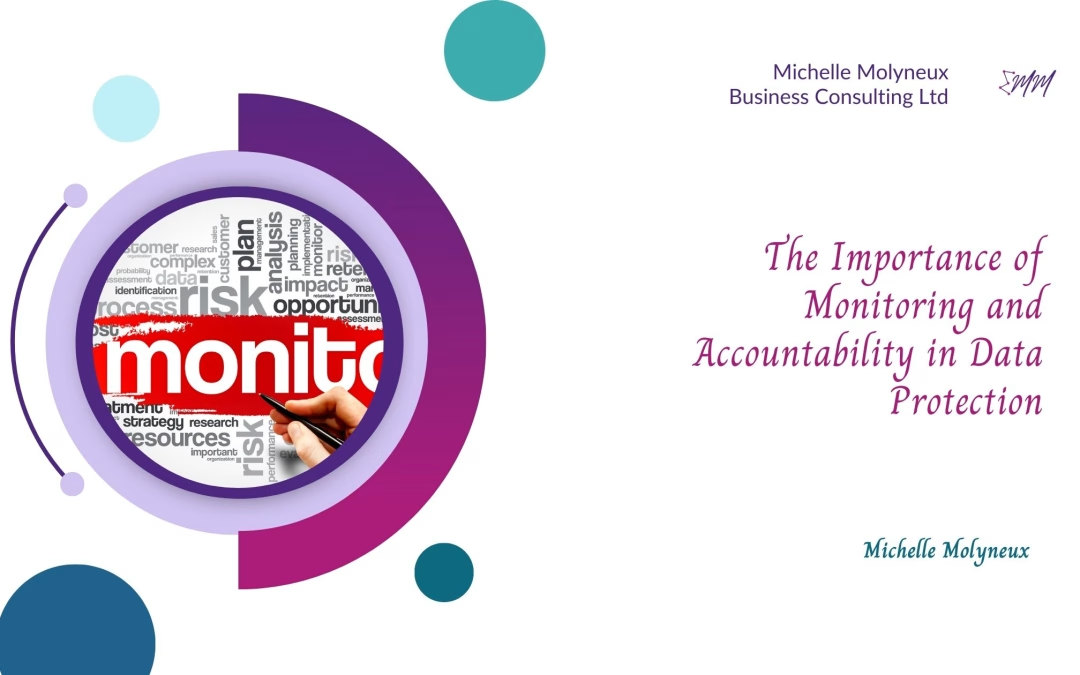I don’t need to tell you data protection is a critical concern for businesses of all sizes. For micro and small businesses, navigating the complex landscape of data protection regulations such as the UK GDPR, the Data Protection Act 2018, and the Privacy and Electronic Communications Regulations (PECR) can be overwhelming. One of the key aspects of data protection that is often confused is the importance of monitoring and accountability. What do these terms mean, and why are they vital for your business? This blog will demystify these concepts and provide practical tips to help you implement effective monitoring and accountability practices.
What is Monitoring in Data Protection?
Monitoring in data protection involves regularly reviewing and assessing how your business handles personal data. This includes ensuring that data processing activities comply with relevant regulations, identifying potential risks, and taking steps to mitigate them. Effective monitoring helps you stay proactive, catching issues before they escalate into significant problems.
What is Accountability in Data Protection?
Accountability means demonstrating that your business complies with data protection laws. It’s not enough to follow the rules; you must also be able to show how you comply. This involves keeping detailed records of your data processing activities, implementing appropriate policies and procedures, and regularly reviewing and updating these measures.
Practical Tips for Implementing Monitoring and Accountability
1. Establish Clear Policies and Procedures
Start by creating clear data protection policies and procedures tailored to your business’s specific needs. These should cover how personal data is collected, used, stored, and shared. Make sure all employees understand and follow these policies.
2. Conduct Regular Audits
Regular audits are essential for effective monitoring. Schedule periodic reviews of your data protection practices to ensure compliance. These audits should assess everything from data collection methods to how data is stored and deleted.
3. Train Your Staff
Your employees play a crucial role in maintaining data protection standards. Provide regular training to ensure everyone understands their responsibilities and stays updated on the latest regulations and best practices.
4. Maintain Comprehensive Records
Keeping detailed records of your data processing activities is a key accountability aspect. This includes documenting the types of data you collect, the purposes for which you use it, and how long you retain it. These records should be readily accessible in case of an audit or data breach.
5. Use Technology to Your Advantage
Leverage data protection tools and technologies to automate monitoring processes. Various software solutions can help you track data processing activities, identify potential risks, and ensure compliance.
6. Outsource your data protection
Just like you would outsource your IT and HR support, you outsource your data protection support. If your business processes large volumes of personal or sensitive data, you may consider appointing a Data Protection Officer (DPO). By outsourcing your needs, we can create a strategy and work with you to ensure that you remain compliant with regulations and implement best practices.
Conclusion
Monitoring and accountability are fundamental components of effective data protection. You can ensure that your business remains compliant with data protection regulations by establishing clear policies, conducting regular audits, training your staff, maintaining comprehensive records, leveraging technology, and possibly appointing a Data Protection Officer. This will help you avoid potential fines and legal issues and build trust with your customers, showing them that you take their privacy seriously.
Interactive Element: Data Protection Checklist
Use the following checklist to ensure your business is on the right track with monitoring and accountability:
- Establish Clear Policies and Procedures: Tailored to your business needs and communicated to all employees.
- Conduct Regular Audits: Schedule periodic reviews of data protection practices.
- Train Your Staff: Provide ongoing training on data protection responsibilities and best practices.
- Maintain Comprehensive Records: Document all data processing activities and keep records accessible.
- Leverage Technology: Use data protection tools to automate monitoring processes.
- Outsource your data protection support: Consider this if you are a growing business and need to establish the foundations to safeguard your business and team.
For more detailed guidance, visit the ICO guidelines on accountability. Alternatively, you can book a clarity call to identify the next steps.
Other blogs you may be interested in

